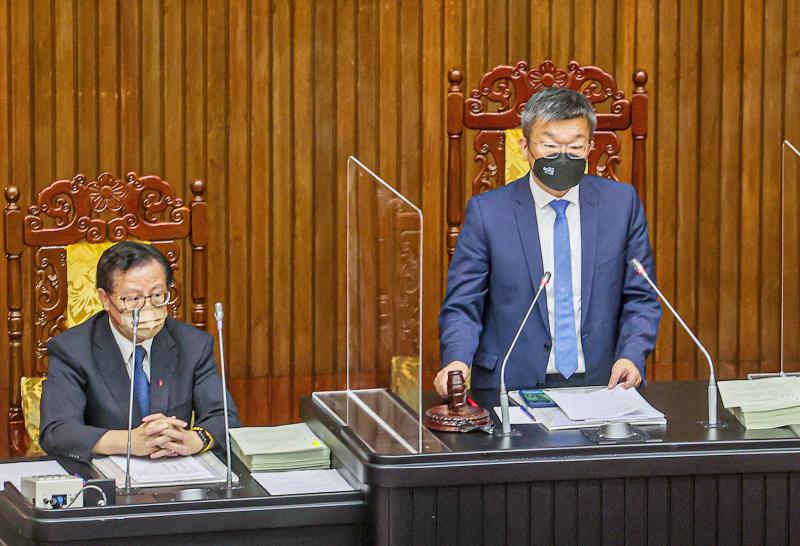The legislature yesterday passed the third reading of an amendment to the Public Functionary Service Act (公務員服務法), which specifies the maximum number of working hours for civil servants and relaxes rules regarding work outside of their government jobs.
The Examination Yuan said it proposed the amendment because the content, strictness and scope of regulations concerning public servants needed updating to meet changes in society.
The proposal was in line with Constitutional Judgement No. 785, which sets the maximum number of working hours and states that a shift system should be established to protect public servants’ health and right to hold public offices.

Photo: CNA
Article 4 of the act prohibits public servants from making statements about their duties or on behalf of their agencies or institutions without the permission of their superiors.
The amendment retains those restrictions, but adds that they are also prohibited from making statements about the services provided by their agencies or institutions.
The amendment also stipulates that public servants must adhere to their designated work schedules, and not arrive late or leave early. Total working hours should be eight hours per day and 40 hours per week, and they should take two days off per week.
Working hours can be adjusted as long as public services are not affected, it says.
The regulation applies to the Presidential Office, the National Security Council, authorities of schools at all levels and the Executive Yuan.
Overtime cannot result in a public servant working more than 12 hours per day, and they cannot work more than 60 hours of overtime per month, it says.
However, while engaging in disaster relief, dealing with urgent or sudden incidents or handling special projects, public servants’ maximum overtime working hours can be set by the Presidential Office, the National Security Council or the five branches of government, it says.
Intervals between each shift should be at least 11 hours, but exceptions can be made for special circumstances, it adds.
Public servants cannot engage in outside work that requires additional certification, but can participate in charitable activities and other nonrecurring, noncontinuous work outside their contracted working time as long as their full-time job is not affected, it says.
It also allows public servants to earn money outside of work using their skills, through sale of property, or through use of their intellectual property or portrait rights.
Civil servants’ pursuits outside of work must not tarnish the reputation of public servants or the government, nor obstruct or conflict with their full-time jobs, it adds.

Taiwan has received more than US$70 million in royalties as of the end of last year from developing the F-16V jet as countries worldwide purchase or upgrade to this popular model, government and military officials said on Saturday. Taiwan funded the development of the F-16V jet and ended up the sole investor as other countries withdrew from the program. Now the F-16V is increasingly popular and countries must pay Taiwan a percentage in royalties when they purchase new F-16V aircraft or upgrade older F-16 models. The next five years are expected to be the peak for these royalties, with Taiwan potentially earning

STAY IN YOUR LANE: As the US and Israel attack Iran, the ministry has warned China not to overstep by including Taiwanese citizens in its evacuation orders The Ministry of Foreign Affairs (MOFA) yesterday rebuked a statement by China’s embassy in Israel that it would evacuate Taiwanese holders of Chinese travel documents from Israel amid the latter’s escalating conflict with Iran. Tensions have risen across the Middle East in the wake of US and Israeli airstrikes on Iran beginning Saturday. China subsequently issued an evacuation notice for its citizens. In a news release, the Chinese embassy in Israel said holders of “Taiwan compatriot permits (台胞證)” issued to Taiwanese nationals by Chinese authorities for travel to China — could register for evacuation to Egypt. In Taipei, the ministry yesterday said Taiwan

‘LIKE-MINDED PARTNER’: Tako van Popta said it would be inappropriate to delay signing the deal with Taiwan because of China, adding he would promote the issue Canadian senators have stressed Taiwan’s importance for international trade and expressed enthusiasm for ensuring the Taiwan-Canada trade cooperation framework agreement is implemented this year. Representative to Canada Harry Tseng (曾厚仁) in an interview with the Central News Agency (CNA) said he was increasingly uneasy about Ottawa’s delays in signing the agreement, especially as Ottawa has warmed toward Beijing. There are “no negotiations left. Not only [is it] initialed, we have three versions of the text ready: English, French and Mandarin,” Tseng said. “That tells you how close we are to the final signature.” Tseng said that he hoped Canadian Prime Minister Mark Carney

POSITIVE DEVELOPMENT: Japan and the US are expected to hold in-depth discussions on Taiwan-related issues during the meeting next month, Japanese sources said The holding of a Japan-US leaders’ meeting ahead of US President Donald Trump’s visit to China is positive news for Taiwan, former Japan-Taiwan Exchange Association representative Hiroyasu Izumi said yesterday. After the Liberal Democratic Party’s landslide victory in Japan’s House of Representatives election, Japanese Prime Minister Sanae Takaichi is scheduled to visit the US next month, where she is to meet with Trump ahead of the US president’s planned visit to China from March 31 to April 2 for a meeting with Chinese President Xi Jinping (習近平). Japan and the US are expected to hold in-depth discussions on Taiwan-related issues during the